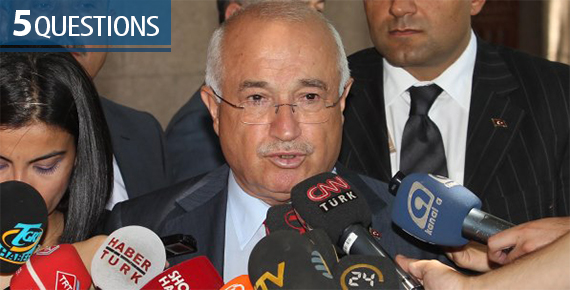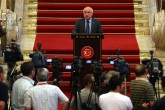1. Commenting on the withdrawal of the Parliamentary Speaker Cemil Cicek from the Constitutional Reconciliation Commission, Mustafa Sentop, a commission member from the AK Party, stated that “the Commission practically came to an end.” Why did the Commission come to an end?
Soon after it was established, the Constitutional Reconciliation Commission began gathering demands for the new Constitution and launched the constitution-drafting process in May 2012. According to the schedule, the Commission was supposed to complete the drafting of the Constitution by the end of 2012. However, the Parliamentary Speaker had to prolong the drafting process a few times and the Commission barely agreed on 60 articles during the writing process lasting 25 months. In the last three months, the process was blocked and the Commission failed to reach a consensus on around 110 articles on which it had been working. So, it is a realistic approach to say that the Commission practically came to an end. The reason is that local elections in March 2014 and the Presidential elections in August 2014 will be on top of the political agenda and overshadow the constitution-drafting. It seems difficult to reach a consensus required for a constitution draft in a political environment of struggle and tension caused by the election process.
2. Has the Commission worked in vain to date?
It would be unfair to say that the Commission has worked in vain until today. Above all, for the first time in Turkey a Parliament which represents 95 percent of the society through normal and democratic processes, gathered opinions of people and civil society organizations for months and tried to prepare a draft constitution based on consensus among all political parties. It is possible to say that this experience alone is a gain. Secondly, works of the new Constitution paved the way for political circles and the society to thoroughly discuss numerous constitutional issues by adding them to their agenda. During this process, tens of constitutional proposals were prepared, numerous Constitutional meetings were held; reports, articles, books were drafted and a comprehensive acquis was prepared. In other words, not only the state authorities but also political circles and the society had a say in constitutional issues. It is possible to say that there has been a significant load of material and works for the new Constitution process and that we will not go back to square one.
3. Sentop from the AK Party also stated that “the Commission is no longer a means for the new Constitution but an obstacle.” What are the obstacles that the Commission poses?
It is possible to say that the Commission has certain structural characteristics that may pose obstacles to the drafting of the new constitution. One of the rules of order for the Commission was to seek unanimity for every decision. Accordingly, all four political parties were required to agree on an article to be drafted. Jurists such as Ergun Özbudun even at the beginning asserted that it would be impossible to reach a consensus on controversial issues. Indeed, it was clear, for instance, that drafting a constitutional text on the Kurdish issue on which the Peace and Democracy Party (BDP) and the Nationalist Movement Party (MHP) will agree was impossible. It was evident from the very beginning that not only this issue but also other controversial issues would create a bottleneck. Furthermore, the Commission’s rules of order included a provision stipulating that the Commission shall be repealed if any of the political parties withdraws. Drafting a constitution by one hundred percent consensus is not possible in almost any society. As a matter of fact, in none of the countries, which drafted a new Constitution in similar democratic processes, sought a one hundred percent consensus for the Constitution. Consequently, that all political parties had three representatives in the Commission and had equal power in the
In this article
- 5 Questions
- Domestic Policy
- Opinion
- 2012
- 2014
- bdp
- cemil cicek
- Constitutional Reconciliation Commission
- Elections
- Kurdish Community
- Kurdish Question
- Local Elections
- New Constitution
- Q&A
- Recep Tayyip Erdoğan
- SETA
- SETA 5 Questions
- Turkish Local Elections
- Türkiye's Justice and Development Party | AK Party (AK Parti)
- Türkiye’s Nationalist Movement Party (MHP)



